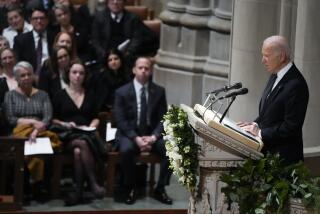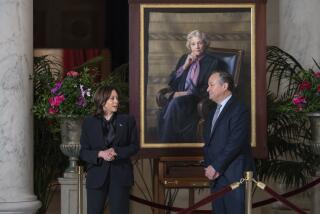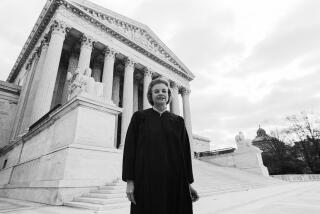Ginsburg Takes Oath for Supreme Court : Law: The second woman among the justices says diversity in the judiciary will increase. Clinton praises her career.
WASHINGTON — Ruth Bader Ginsburg, declaring that her ascension heralded new heights of diversity in the American judiciary, was sworn in Tuesday as the nation’s 107th Supreme Court justice in a joyous White House East Room ceremony.
Ginsburg, 60, became the second woman on the high court, joining Justice Sandra Day O’Connor, who was named to the bench in 1981 by former President Ronald Reagan.
“Times are changing,” said the women’s rights pioneer who has served for 13 years as a federal appeals court judge. “In my lifetime, I expect there will be among federal judicial nominees based on the excellence of their qualifications as many sisters as brothers in law. That prospect is indeed cause for hope, and its realization will be cause for celebration.”
Chief Justice William H. Rehnquist administered the oath of office as dozens of Ginsburg colleagues, friends and family members looked on. Among those in the audience were former Chief Justice Warren E. Burger, former associate Justice William J. Brennan, Vice President Al Gore and First Lady Hillary Rodham Clinton.
Ginsburg paid special tribute to her husband of 39 years, tax attorney Martin Ginsburg, and her mother-in-law, Evelyn Ginsburg.
Asking the elder Mrs. Ginsburg to take a bow, the new associate justice said, her voice choking: “She was always there when I needed her. She constantly upheld my spirits when the going got rough.”
Also attending the ceremony were her son, James, her daughter, Jane, and two grandchildren.
The President, paying tribute to Ginsburg’s career as a legal activist, professor and judge, said: “Now, Ruth Bader Ginsburg’s greatest challenge lies ahead, a challenge to which she brings a powerful mind, a temperament for healing, a compassionate heart, a lifetime of experience. Her story already is a part of our history. Now, her words and her judgments will help to shape our nation today and well into the 21st Century.”
Clinton said that “all Americans celebrate” Ginsburg’s appointment and said her 96-3 confirmation by the Senate last week was the swiftest in nearly 20 years.
She replaces retired Justice Byron R. White and is expected to add a more liberal voice to a court grown increasingly conservative over the last 15 years. However, Clinton noted, she has avoided ideological typecasting and her record on the bench is marked by procedural conservatism and a reverence for precedent.
As an appeals court judge, Clinton noted, “she defied labels like liberal and conservative just as she did in her hearing before the Senate to earn a reputation for something else altogether--excellence.”
Earlier in the day, Clinton signed into law his budget bill, which contains the outline of his tax and deficit-reduction plans for the next four years.
In a huge outdoor ceremony on the White House South Lawn, Clinton praised lawmakers who voted for the plan for courage in supporting a painful and poorly understood piece of legislation.
He defended the massive bill as an effort to reverse 12 years of “trickle-down” Republican economic policies and as the beginning of a “new direction” for the country.
He said he was disappointed that the debate over the bill deteriorated into a nasty partisan brawl rather than the elevated discussion of the nation’s economic future that he said he intended.
Clinton also tried to reassure congressional Democrats who voted for the bill and now fear the wrath of hometown voters in the 1994 campaign.
“If you go home and look your people in the eye and tell them you were willing to put your job on the line so that they can keep their jobs, I think they will understand and reward you with reelection,” he said.
He then called on Congress to cast aside partisan differences and move forward on the remaining elements of his legislative agenda--health and welfare reform, an anti-crime package and the North American Free Trade Agreement.
“Toward this end, let me say again, in the long run we cannot succeed in an endless season of partisan bitterness and rancor and bickering,” the President said. “If some of us have to make hard choices while others stand aside and hope that the house collapses, nothing will in the end get done.”
Clinton ended his day with a private White House dinner for the nation’s 16 most senior military officers--the 10 top regional commanders and the six members of the Joint Chiefs of Staff.
A number of the officers are in the running for the uniformed military’s top job, chairman of the Joint Chiefs of Staff. The current chairman, Gen. Colin L. Powell, retires Sept. 30 and an intense behind-the-scenes race is on to replace him. Tuesday’s dinner, which included the officers’ wives, served as an informal job interview for some of the leading candidates.
More to Read
Get the L.A. Times Politics newsletter
Deeply reported insights into legislation, politics and policy from Sacramento, Washington and beyond. In your inbox three times per week.
You may occasionally receive promotional content from the Los Angeles Times.










